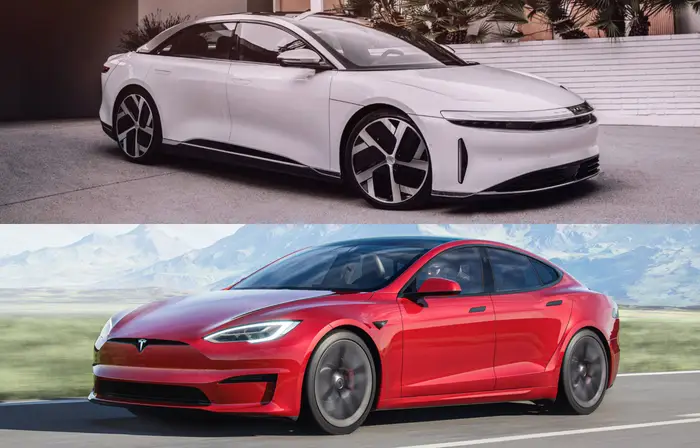The electric vehicle (EV) revolution is no longer on the horizon—it’s here. Tesla, the pioneer of mass-market EVs, and Lucid Motors, the luxury newcomer, are at the forefront of this transformative era. As we approach 2025, the competition between these two giants has reached a fever pitch, with both brands pushing boundaries in innovation, luxury, and performance.
But which one will dominate the luxury EV market? Let’s break it down.
Tesla: The Pioneer and Market Leader
Tesla’s Dominance
Since its inception, Tesla has been synonymous with electric vehicles. Under Elon Musk’s leadership, Tesla has built a reputation for innovation, scalability, and groundbreaking technology.
- Key Models for 2025:
- Model S Plaid: The performance EV with a 0-60 mph time of under 2 seconds.
- Cybertruck: A futuristic take on the luxury utility vehicle.
- Roadster: Promised to be the fastest car in the world with a top speed exceeding 250 mph.
Tesla has managed to keep competitors at bay through its supercharger network, autonomous driving capabilities, and ecosystem integration.

Strengths of Tesla
- Wide Availability: Tesla’s production scale allows for broader accessibility, even for high-end models.
- Autopilot & FSD (Full Self-Driving): Tesla’s autonomous driving software remains ahead of most competitors in terms of functionality and ease of use.
- Brand Recognition: Tesla has become a cultural icon, making it the «go-to» EV brand for luxury enthusiasts and tech aficionados alike.
Challenges for Tesla
- Build Quality: Tesla has faced criticism over inconsistent panel gaps and material quality in its vehicles.
- Luxury Perception: Despite its technological edge, Tesla’s minimalist interiors and mass-market appeal sometimes fall short of what traditional luxury buyers expect.
- Increased Competition: Brands like Lucid, Mercedes-Benz EQ, and Porsche Taycan are nibbling away at Tesla’s dominance in the high-end segment.
Lucid Motors: The Rising Star
Lucid’s Approach to Luxury
Lucid Motors is redefining what it means to drive a luxury EV. With Peter Rawlinson, Tesla’s former chief engineer, at the helm, Lucid has combined technical expertise with a keen focus on premium quality.
- Key Model: Lucid Air
- Dream Edition: Offers up to 1,111 horsepower and an industry-leading range of 516 miles per charge.
- Pure: A more affordable version that doesn’t compromise on elegance or performance.
Lucid aims to create cars that don’t just perform but provide an opulent driving experience akin to Rolls-Royce or Bentley.

Strengths of Lucid
- Range: Lucid Air leads the industry with over 500 miles per charge, far exceeding Tesla’s Model S.
- Interior Design: Lucid cars feature expansive glass canopies, premium leather, and meticulous craftsmanship, delivering a more traditional sense of luxury.
- Exclusive Appeal: With limited production numbers, owning a Lucid feels more bespoke and exclusive.
Challenges for Lucid
- Production Capacity: Lucid’s manufacturing scale is far smaller than Tesla’s, limiting its ability to meet demand.
- Price Point: Lucid vehicles often cost more than their Tesla counterparts, potentially pricing out some buyers.
- Limited Infrastructure: Unlike Tesla’s extensive supercharger network, Lucid relies on third-party charging solutions, which can be less convenient.
Head-to-Head Comparison: Tesla vs. Lucid
Performance
- Tesla: Known for its instant torque and acceleration, the Model S Plaid accelerates from 0-60 mph in just 1.99 seconds, a feat few vehicles can match.
- Lucid: While slightly slower at 2.5 seconds, the Lucid Air Dream Edition compensates with more horsepower (1,111 vs. Tesla’s 1,020).
Winner: Tesla edges out in sheer speed, but Lucid offers a more balanced performance-luxury blend.
Range
- Tesla: The Model S Long Range delivers up to 405 miles on a single charge.
- Lucid: The Air Dream Edition trumps Tesla with an EPA-estimated range of 516 miles.
Winner: Lucid is the clear leader in range, making it the ideal choice for long-distance drivers.
Interior and Comfort
- Tesla: Minimalist design with a focus on tech, including a 17-inch central touchscreen and yoke steering wheel.
- Lucid: Luxurious interiors with materials like open-pore wood, leather, and a spacious, airy cabin.
Winner: Lucid’s attention to detail and premium materials make it the better choice for luxury buyers.
Technology
- Tesla: Tesla’s Autopilot and FSD are still the most advanced semi-autonomous systems available.
- Lucid: Lucid’s DreamDrive technology offers similar features, but it’s not as mature as Tesla’s system.
Winner: Tesla retains its crown in technology, though Lucid is closing the gap.

Charging Infrastructure
- Tesla: Over 40,000 Superchargers worldwide ensure convenience for Tesla owners.
- Lucid: Partners with Electrify America, but the network is smaller and less integrated.
Winner: Tesla’s robust infrastructure gives it a significant edge.
Price
- Tesla: Offers more affordable luxury EV options, with the Model S starting at $88,490.
- Lucid: The Air starts at $87,400, but premium trims like the Dream Edition exceed $169,000.
Winner: Tesla wins for affordability, but Lucid’s pricing reflects its exclusivity.
The Future Outlook
Tesla’s Path
Tesla’s focus on scalability and innovation ensures it remains a dominant force in the EV market. By 2025, Tesla’s autonomous driving technology and new models like the Cybertruck and updated Roadster are expected to solidify its lead.
- Key Initiatives: Expansion of its Supercharger network, introduction of the $25,000 «Model 2,» and further advancements in battery technology.
Lucid’s Ambitions
Lucid is carving out a niche in the ultra-luxury EV market. Its commitment to range, comfort, and exclusivity positions it as a strong contender, especially among buyers who prioritize luxury over mass appeal.
- Key Initiatives: Expansion of its lineup with more affordable models and investment in its Casa Grande manufacturing plant to increase production.
Who Will Dominate the Luxury Market?
The answer depends on what buyers value most:
- For Tech Enthusiasts: Tesla’s advanced software, charging infrastructure, and affordability make it the go-to brand.
- For Luxury Seekers: Lucid’s focus on comfort, range, and exclusivity makes it the superior choice for high-end buyers.
Ultimately, Tesla’s scale and technological edge will likely keep it ahead in market share, but Lucid’s craftsmanship and luxury appeal ensure it will dominate the ultra-luxury EV segment. The battle for 2025 will not be about one brand outpacing the other but rather each excelling in its niche.
Conclusion
Tesla and Lucid represent two distinct visions of the future. Tesla focuses on innovation and accessibility, bringing EVs to the masses while maintaining a foothold in the luxury space. Lucid, on the other hand, offers a more traditional luxury experience, appealing to those who want the pinnacle of refinement in an electric vehicle.
As 2025 approaches, both brands will continue to push boundaries, ensuring that the real winners are the consumers who benefit from unparalleled choice, performance, and sustainability. Whether you choose Tesla or Lucid, one thing is clear: the future of luxury driving is electric.




